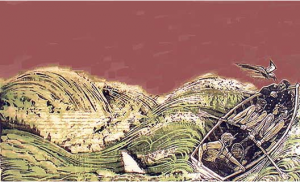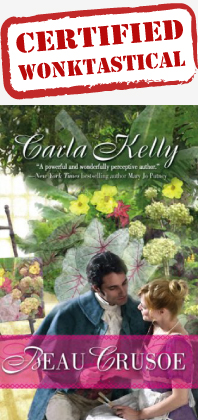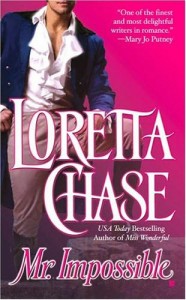So I recently read Carla Kelly’s Beau Crusoe, and now I can’t shut up about it.
I read it because Willaful mentioned it in the comments to Cara’s last post about heroines. Cara threw out a reference to “the romance novel version of Alive” and Wilaful said, “Hey, I’ve read that!” As soon as I understood that she wasn’t kidding — that in fact a romance existed somewhere in which the hero ate people — I zipped right over to Amazon and bought it.
I KNOW.
Beau Crusoe is a regency historical whose hero, James Trevenen, recently returned to England after surviving being stranded for five years on an uninhabited island. Before he made it to the island, he was in an open boat for at least a week with several other members of the crew. Only James survived. And no, he didn’t eat all of the others, but some pretty gruesome shit happened, and he was in charge.
(Though, refreshingly, Trevenen is not a big important admiral or something. He was a navy midshipman, and though he has some money, he’s not a high-society guy. The only reason he’s in London is because he wrote a treatise about the crabs that lived on his island, and he’s going to get a medal from the Royal Society for it. Also, he has an obscene tattoo and uses bad language that the heroine rolls her eyes over. Yay for a historical with a non-aristocratic hero!)
So anyway, I couldn’t wait to fall virtually in love with this guy. A couple people on Twitter suggested there might be something wonked about the depth of my excitement about this book, which made me wonder, Why did I want to read it so badly? What appeals to me about the story of a man who’s broken what is indisputably one of the Top Five Taboos in the vast majority of world cultures?
Partly, it’s just that. I mean, when it comes to the Damaged Hero, go big or go home, right? The stakes can hardly be too high. And, more to the point, I wanted to see how Carla Kelly would deal with the emotional aftermath of such an event. Would the hero be traumatized and angsty? Would he have nightmares about eating people? Would he be indifferent, hardened, cold? Psychologically, he’s automatically thirty degrees more wonked than the average hero. After all, James Trevenen isn’t simply a loner. No, he’s a man who just spent five years as an involuntary hermit. He’s not brooding over a difficult divorce. Nope, he’s haunted by a huge, psychologically scarring trauma that took place over a five-year period. How can he come home again? How can anybody ever return to the ton after spending half a decade palling around with crabs? Can Carla Kelly make me believe that a man in such a thoroughly screwed up situation might actually be capable of falling in love?
Yes. She can.
And it’s even better that this is a historical novel, because the means by which historical romance novels torture their heroes are so often frivolous. There’s so much white-male-social-class-related woe. Oh, I’m a bastard, and the ton will never accept me! I got married over the anvil, and I can no longer waltz in the finest English ballrooms! Wah! Whereas this guy — HE ATE PEOPLE. And that’s not really the biggest of his worries, frankly. I’m not going to spoil the whole book, but his psychological landscape is complex and interesting and really, really cool.
In the end, though, what made Beau Crusoe not simply the best cannibalism romance I’ve ever read but rather one of the best historical romances I’ve read, period, is that Carla Kelly doesn’t allow the story to descend into a pit of angst. Beau Crusoe is — wait for it — funny. It is, at its core, rather lighthearted and hopeful, even as it takes on some seriously gritty themes and does a damn fine job of grappling with them. What makes a man admirable? What does it mean to be brave? Who deserves admiration and acclaim? There’s even some excellent stuff about adultery in there, and morality, and the meaning/value of sex.
It’s so wonked, and so worth it.
I’ll leave you with one of my favorite passages from an early chapter. Keep in mind that we barely know the hero yet.
He looked around to see the innkeeper bringing out a roast of beef, all steaming and cunningly sliced so the tender, moist pink interior winked at him like… Oh, God, and now he was thinking of Artemesia, Lady Audley, with her legs spread wide, eager to seduce him after they left the miserable fever harbor of Batavia, prepared to cross the Indian Ocean.
She had succeeded with neither a gasp nor a whimper from him, starved as he had been after five years of abstinence from the delights of both bed and table. The only thing that could have made that first climax more piquant would have been to clutch a chicken leg in one hand as he rode Lady Audley to the finish line.
*happy sigh* Don’t you just love him already?
* * *
Beau Crusoe by Carla Kelly | Goodreads | Amazon | Harlequin | B&N



 I’m a reader. Do you remember that Twilight Zone with that bookish man, I think he was a librarian. Well, the whole world ended. It all fell apart and everyone died. And he’s like, meh, I’ve got my books. And then his glasses broke. That was the twist, that his glasses broke. And the pain of it, my god, that he would forever be surrounded by books, unable to read them, until he died. It tore me up inside, and I think I was like ten when I saw it. Because I’m a reader through-and-through.
I’m a reader. Do you remember that Twilight Zone with that bookish man, I think he was a librarian. Well, the whole world ended. It all fell apart and everyone died. And he’s like, meh, I’ve got my books. And then his glasses broke. That was the twist, that his glasses broke. And the pain of it, my god, that he would forever be surrounded by books, unable to read them, until he died. It tore me up inside, and I think I was like ten when I saw it. Because I’m a reader through-and-through.




















